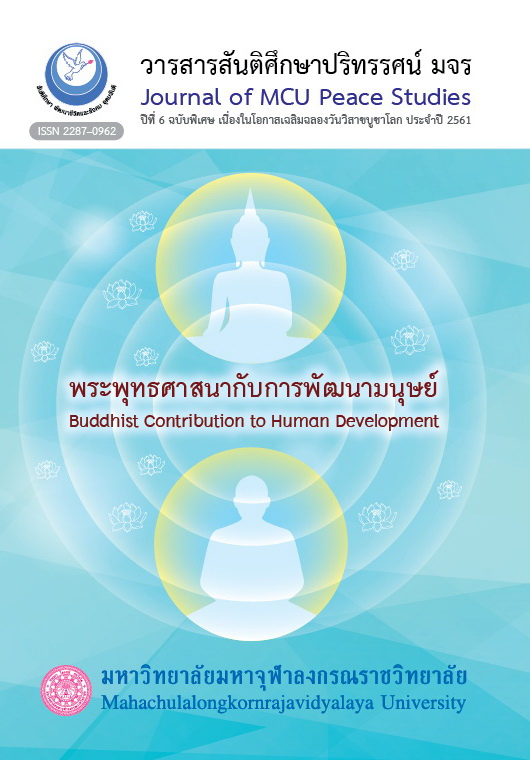Ālayavijñāna of the Concept of Yogācāra Buddhist Philosophy in the View of the Theravāda Buddhist Philosophy
Main Article Content
บทคัดย่อ
This research paper has thee objectives, 1) to study the Viññāṇa in Theravāda Buddhist Philosophy, 2) to study the Ālayavijñāṇa in the concept of Yogācāra Buddhism, and 3) to analytically study of the Ālayavijñāṇa in the concept of Yogācāra Buddhism in the view of the Theravāda Buddhist Philosophy. This research is used by the documentary research, which is the critical analysis.
The result of research found that the issue of Viññāṇa in Theravāda Buddhist Philosophy is Realism, from the concept of Viññāṇa (consciousness) is Nibbāna. In the Four Elements and Upādāyarupa: Deivative Forms which are not in consciousness. The Nama and Rupa are extinguished in consciousness because the consciousness is extinguished. The consciousness is called mind, it means the mind having known in mental objects, there are four meaning, (1) knowing thought, (2) knowing building, (3) knowing collection, and (4) knowing fineness. These are appeared in the five Aggregates and the twelve Dependent Originations. It is classified into the six consciousnesses as cross the world and in the present life. All consciousnesses have just shown to be the Ti-Lakkhaṇa or the Dependent Origination, it said that the process of rising – falling according to its functions. Then the concept of Ālayavijñāṇa in Yogācāra is Idealism. Yogācāra holds that “Vijñāṇa or mind is only one reality that exists” it is to present that the mind is the only thing to exist. The external objects do not exist as a dream or an illusion. It has three meanings; (1) knowing accumulation, (2) knowing creation, and (3) knowing the mental formation. The Vijñāṇa is classified into eight kinds to know external and internal world. It is espically the Ālayavijñāṇa which is the first consciousness asbasis of the world to collect, to keep, and to create all things.
The concept of Ālayavijñāṇa in Theravāda Buddhist Philosophy is classified into extremely Idealism which has the interpretation to philosophy in Vedanta that is Atman and Paramatman or the doctrine that soul and the world are eternal (Sassataditthi). Although Yogācāra has developed the theory of Ālayavijñāṇa from Bhavanga-citta of Theravada Buddhism to the universal mind, it has presented that the achievement of the highest goal is the enlightenment of emptiness from the person and emptiness from the doctrines. But Yogācāra has still asserted that the aggregates, and all elements are cause of objects and condition in the world, it has no nothing, it is just mind only exists.
Article Details
ทัศนะและความคิดเห็นที่ปรากฏในบทความในวารสาร ถือเป็นความรับผิดชอบของผู้เขียนบทความนั้น และไม่ถือเป็นทัศนะและความรับผิดชอบของกองบรรณาธิการ ยินยอมว่าบทความเป็นลิขสิทธิ์ของวารสาร


